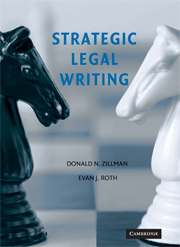Book contents
- Frontmatter
- Contents
- Origins of the Book
- What Is Strategic Legal Writing?
- Using the Text
- Introduction to Chapters One, Three, Five, Seven, and Nine
- Introduction to Chapters Two, Four, Six, Eight, and Ten
- Overview
- 1 Prayer at the Athletic Banquet
- 2 How to Draft a Complaint
- 3 Terminating Professor Melton
- 4 How to Draft a Motion
- 5 Mr. Blaustein's Gift
- 6 How to Respond to a Motion
- 7 Counseling Dean Covelli
- 8 How to Draft a Judicial Opinion
- 9 Advising Professor Melton
- 10 How to Draft a Motion for Summary Judgment
- Follow-Up Sections
- Index
Overview
Published online by Cambridge University Press: 08 February 2010
- Frontmatter
- Contents
- Origins of the Book
- What Is Strategic Legal Writing?
- Using the Text
- Introduction to Chapters One, Three, Five, Seven, and Nine
- Introduction to Chapters Two, Four, Six, Eight, and Ten
- Overview
- 1 Prayer at the Athletic Banquet
- 2 How to Draft a Complaint
- 3 Terminating Professor Melton
- 4 How to Draft a Motion
- 5 Mr. Blaustein's Gift
- 6 How to Respond to a Motion
- 7 Counseling Dean Covelli
- 8 How to Draft a Judicial Opinion
- 9 Advising Professor Melton
- 10 How to Draft a Motion for Summary Judgment
- Follow-Up Sections
- Index
Summary
To help with strategic legal writing, we recommend two nonlegal books. For advice on how one writes, we recommend The Elements of Style by E. B. White and William Strunk, Jr. There are many imitators, but that classic remains the best and most concise guide to clear, crisp writing. For strategic advice on why one writes, we recommend The Seven Habits of Highly Effective People by Steven R. Covey. First published in 1990, it continues to be a business best seller today. You need to read the entire book for a full appreciation of its powerful insights, but one concept is particularly apt here: Covey's emphasis on what is effective. As applied to strategic legal writing, Covey might say that you need to begin each assignment “with the end in mind” and then work backwards to figure out what is necessary to achieve your goal.
Inspired by those two books, we offer the following summary of the most important elements of strategic legal writing:
Start by defining a reasonable goal and then gather what you need to advance your objective.
Develop a factual chronology that tells your client's “story” from start to finish.
Determine the general legal rules and exceptions, and their application in specific instances, so you can say with confidence: this is the controlling test.
Develop a theme and provide context so it is clear where your case fits in the larger scheme of things.
Organize your writing so the reader can follow the path of your argument without feeling “lost.”
Argue by analogy so it is clear that justice is on your side because similar situations were treated the same way that you want your client to be treated.
[…]
- Type
- Chapter
- Information
- Strategic Legal Writing , pp. xxvii - xxviiiPublisher: Cambridge University PressPrint publication year: 2008



